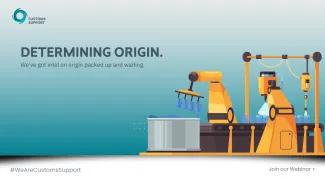How you determine the rules for declaring preferential origin in the UK?
It depends on which trade agreement is being applied. What qualifies as preferential origin from one country may not be applicable from another.
Take, for example, a manufactured scooter. If the manufacturing country imports 30% of their parts from China, 30% from India, and then the remaining 40% is from local suppliers, then it may be classified as originating in that local country. However, that country’s trade agreement with the UK might dictate that the scooter needs to be made with over 50% locally sourced content to qualify for preference.
In this situation, the paperwork will state the goods origin, but preference will not be applicable.
What manufacturers also need to bear in mind is whether the goods have been reworked enough to change the origin. If the scooter assembly in this example is simple, such as just adding the wheels or a seat, it does not change the nature or origin of the scooter.
When materials are reworked, such as plastic resin into extruded plastic components, then that process might be enough to allow the new part to be declared as originating in the manufacturer’s country. If the specific rules in the trade agreement are also met then preferential origin can apply. Again, this may be true when that company exports to one country, but not to another.
How can you prove preferential origin?
There are a few ways you can prove preferential origin in the UK, some of which are better than others.
Each agreement will specify which documents are needed to prove preferential origin, like a GSP Form A or an EUR1. Beware that documents like GSPs are not interchangeable, so goods sold to the EU under GSP do not automatically have GSP preference if they are sold to the UK in transit and cross-traded.
Some agreements also allow exporter’s statements and/or “importer’s knowledge”.
An exporters statement will be on your commercial invoice or on a blanket declaration for goods being moved within a certain period, and will state that the goods are of preferential origin.
“Importer’s knowledge” has caused some confusion since Brexit as it has been incorrectly used in lieu of exporter’s statements on origin. By declaring “importer’s knowledge”, you are advising HMRC that you know for certain the goods coming in are of preferential origin.
The issue is that a lot of traders are using “importer’s knowledge” based on the assumption that goods manufactured automatically qualify, like in the scooter example, or declaring it because the shipper is in that country.
What risks do manufacturers face?
From an import perspective, it’s whether they can prove parts have been significantly reworked and the product has the right percentage of assembled components to justify preferential origin claims, or not.
Another risk is not doing due diligence on your exporters’ statements or using “importer’s knowledge” without actually knowing the supplier’s operation.
If HMRC are unable to verify that preferential criteria have been met for either of these cases, HMRC can ask for you to pay duty on all your shipments relating to that business for the last three years. This is devastating to your profit margins and a significant risk to your company as a whole.
From an export point of view, you won’t automatically be liable for your buyer’s taxes, but it will place significant strain on your relationship if you are unable to provide them with proof of preferential origin when asked. There may also be a commercial aspect whereby they request you pay towards their tax bill or you are obligated to do so based on your contacts.
HMRC may also raise sanctions against you as an exporter if you are noncompliant with origin statements on your export paperwork.
What are some best practices for manufacturers to follow?
Verify your supplier’s origin statements with them. Since Brexit, a lot of exporters have put origin and REX statements on their invoices simply because the importer has requested it. They will not hold up if HMRC decide to question your goods origin.
Also, try to move away from “importer’s knowledge” where possible. This method of declaring preferential origin should only be used when you know the ins and outs of that supplier’s operation.
For example, if you are the assembly plant or retailer for the end product, and your company/group also owns the part manufacturer or factory in another country, then you will have access to this information. If you do not, then don’t leave your preferential origin declaration up to chance. Get it verified.
For UK manufacturers who are exporting, get your supplier declarations verified so that you are keeping your customers’ declarations safe and compliant.














